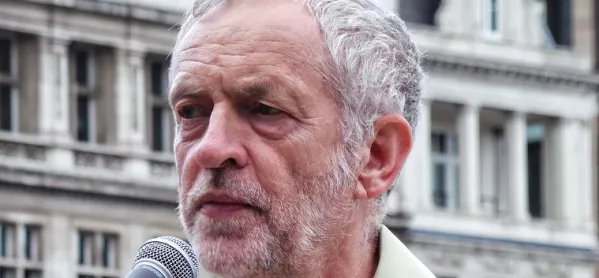- Home
- Jeremy Corbyn: It’s up to colleges to stop strike action
Jeremy Corbyn: It’s up to colleges to stop strike action

Jeremy Corbyn has called on colleges to “get around the table now” and come up with a “reasonable” pay offer for their staff to avert a national strike later this month.
The University and College Union (UCU) and Unison announced last week that members in colleges across England will take action on 24 February, after the Association of Colleges (AoC) said that mounting financial pressures meant that it was “not sustainable” for its members to offer any pay rise for 2015-16.
This was the first time that the AoC, which represents FE colleges in pay negotiations, had not tabled any annual increase for college staff. The association said that a combination of funding cuts and rising pension and national insurance contributions meant that colleges could not afford to offer a pay rise.
But, speaking exclusively to TES this week, the Labour leader said it was “up to colleges to recognise the very hard work [their staff] do”, and called on the government to step in.
Mr Corbyn’s intervention comes as new figures compiled by UCU reveal the massive variation between average salaries on offer at colleges around the country. You can see the full figures here.
Of the institutions that provided salary information to the union, the highest average pay on offer could be found at Redbridge College in East London - £38,209. This was 70 per cent higher than the £22,432 average recorded by Askham Bryan College in North Yorkshire.
While the AoC represents colleges in national bargaining with the unions, each college is free to set its own levels of pay for staff.
‘Real-terms pay cut’
According to Unison and the UCU, college staff across England have suffered a real-terms pay cut of 17.1 per cent over the past five years. With Unison members expected to join the next wave of industrial action later this month, the impact is set to be significantly greater on the sector than it was when the UCU undertook the first strike of the pay dispute back in November 2015.
On that occasion, the union said that more than 200 colleges were affected.
Addressing the UCU’s Cradle to Grave conference in London on Saturday, Mr Corbyn said that many college employees had told him of their “very deep sense of insecurity” about their jobs. In an interview with TES afterwards, Mr Corbyn spoke of his sympathy for people working in the FE sector. “It’s up to colleges to recognise the insecurity of employment in FE, recognise the very hard work that [their staff] do and recognise the long-term cut in pay compared to other sectors, and to come up with a reasonable offer on this,” he said.
“I understand the unions’ position on this; I’ve had it explained to me in great detail by local people. And my message to the government and the colleges is: get around the table now to avoid the strike.”
The AoC declined to respond to the Labour leader’s comments. Last week, Marc Whitworth, director of employment policy and services, said that the AoC was “not in a position to recommend general uplifts on pay where specific financial challenges are faced by our members”. Strikes would prove “very disruptive for colleges and, more importantly, for students”, he added.
In response to Mr Corbyn’s intervention, Michael MacNeil, UCU’s national head of bargaining and negotiations, said: “We welcome all efforts to encourage the employers back round the table to negotiate seriously with us to try and resolve this dispute. Strike action is a last resort and we hope a compromise can be reached. The ball is in the employers’ court.”
Jon Richards, Unison’s head of education, commented: “Unison has been urging the employers to come back to the table to talk. There is still time for them to come up with a fair pay offer that rewards staff. This could happen as early as the Association of Colleges board meeting next week.”
The Department for Business, Innovation and Skills declined to comment.
Corbyn on area reviews
“We’re very concerned. It’s been tried out in Scotland, where we’ve lost a very large number of colleges [with] big mergers going on… And what I see further down the road, then, is centralisation of services, or centralisation of certain services, on certain sites.
“The value of a wraparound FE college [is that] you’ve got A-level students, research students, adult earners, adult education, those with learning difficulties, all at the same site. There is something very good about that, because it serves as a social interaction. It becomes a place of cross-fertilisation of ideas… You end up now in some of the colleges with specific sites dealing with specific things, and it just becomes a kind of separation and that’s what worries me about it.
“And also what worries me is that many of them are going to predicate their growth on sales of property assets. in the big city areas that will mean selling off sites in central cities, moving further and further out. I’m worried about that. We need the involvement of the community.”
This is an article from the 12 February edition of TES. This week’s TES magazine is available in all good newsagents. To download the digital edition, Android users can click here and iOS users can click here
Want to keep up with the latest education news and opinion? Follow TES FE News on Twitter and like TES FE News on Facebook
Keep reading for just £1 per month
You've reached your limit of free articles this month. Subscribe for £1 per month for three months and get:
- Unlimited access to all Tes magazine content
- Exclusive subscriber-only stories
- Award-winning email newsletters



